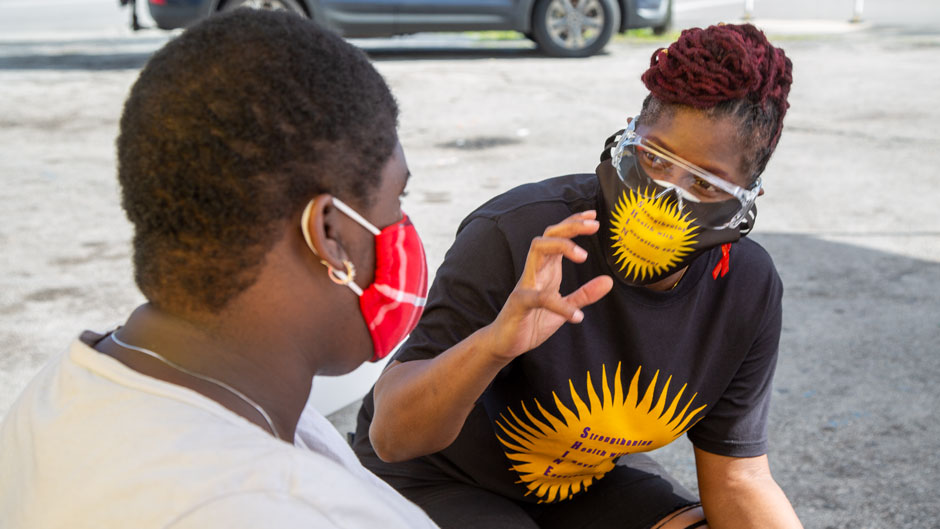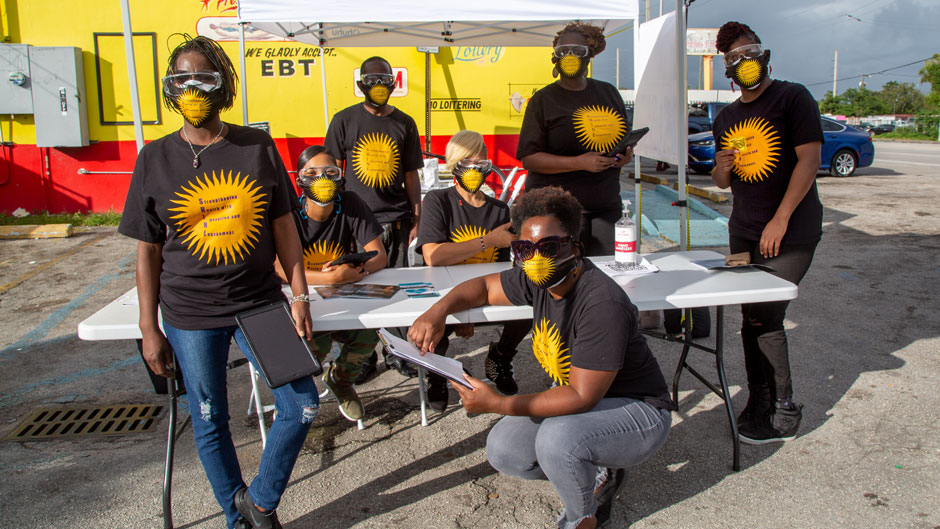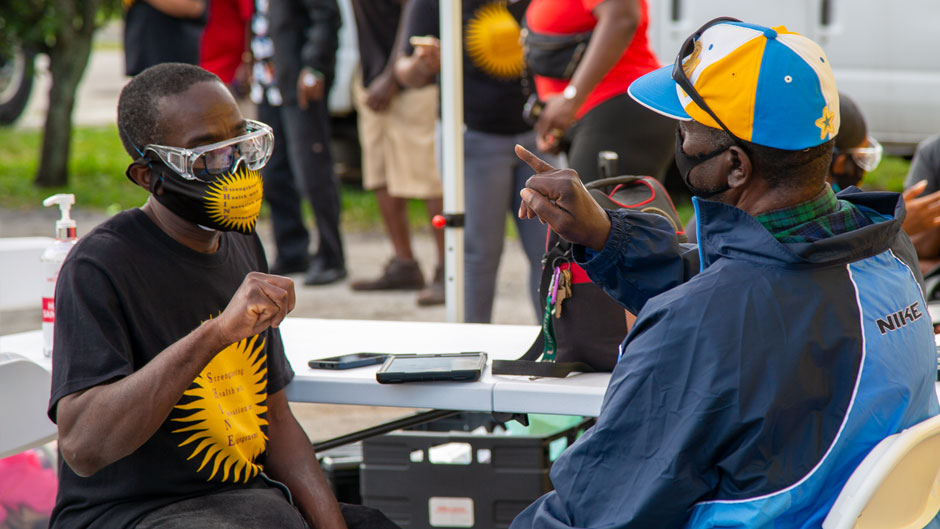The “world-famous conch salad” is a big draw at the BAWA Food Market, but on a recent Saturday afternoon good health was on the menu. That’s what attracted a few dozen people in the parking lot who took a brief University of Miami health survey and free HIV test provided by Empower “U” Community Health Center.
They had an incentive—a $20 voucher to spend in the corner store that has long served the largely Black, West Little River neighborhood. But as customers left the market with bags of free groceries, snacks, and other sundries, they also carried knowledge of their HIV status, some condoms, and the latest information on how to prevent and treat the virus, which like the new COVID-19 pandemic, disproportionately affects Black communities.
Yet, unlike the novel coronavirus that first emerged late last year, there are highly effective pre-exposure prophylaxis (PrEP) medications that can prevent HIV transmission as well as antiretroviral therapies that can reduce the virus to undetectable and non-transmissible levels—allowing people with HIV to live normal lives.
“That’s why this is really important to me—the community aspect of building awareness; educating people sitting under a tree, in a parking lot; letting them know about HIV; and how to stop it,” said Gena Grant, a community consultant with the University’s Strengthening Health with Innovation and Engagement (SHINE) Research Program, who helped guide BAWA customers through the process for taking the health survey and rapid testing.

“I just had an awesome conversation with a middle-aged man who is sexually active, and he asked, ‘Is AIDS still out there?’’’ Grant continued. “I told him, ‘Well, yes, it is and people in your age range are the second highest group behind teenagers getting HIV. He got tested and was happy to tell me he’s negative and wants to keep it that way.”
The outreach event was, coincidentally, held 10 days before World AIDS Day, which is being observed around the globe on Dec. 1 to raise awareness about the virus that, over the past 40 years, has killed about 700,000 people in the United States alone. But as SHINE director Sannisha Dale, an assistant professor of psychology and the director of the mental health disparities core at the University’s Center for HIV and Research in Mental Health (CHARM), hopes to show, awareness in marginalized communities at high risk for HIV doesn’t come from global events.
It comes from casual conversations with people in places they frequent, where they feel comfortable—like the corner stores, barbershops, beauty salons, car-repair garages, and laundromats that the SHINE team is recruiting to host 60 more outreach events and engage around 3,000 residents over the next two years.
Awarded by the National Institutes of Health through CHARM as part of the federal Ending the HIV Epidemic plan, the grant enabled Dale to expand the Five Point Initiative that her team launched last year as a pilot project in ZIP codes with high rates of HIV. Although CHARM, the National Institute of Mental Health’s newest AIDS Research Center, is just two years old, it is already having a meaningful impact in Miami, with community-engaged research like Dale’s.
“The way you reach marginalized communities, Black communities, impoverished communities, is to beat the streets. You go where they are,” said Dale, who hatched her five-point idea while waiting for a car repair in a predominantly Black neighborhood in Boston and chatting with fellow customers about their evening plans and sexual health. “By engaging people where they naturally frequent, we can remove the barriers that stop them from coming to medical centers to be tested, to learn about PrEP, to engage about their sexual health.”

Just as critical as engaging residents, Dale added, is harnessing the knowledge, commitment, and passion of local advocates, and building partnerships with health organizations like Empower “U,” and local businesses that are most familiar with the community—a strategy that was on full display at the BAWA corner store last month. Between them, Grant and SHINE’s four other community consultants—Roxana Bolden, George Gibson, Kalenthia Nunnally, and Alecia Tramel—have more than 150 years of health and HIV advocacy experience.
“There is an exponential amount of expertise, information, knowledge, and awareness here,’’ Dale said, surveying the BAWA parking lot, where her team was easily recognized by the bright sun shining on their SHINE T-shirts and the face masks that they wore over KN-95 masks and below goggles. “So, these conversations about prevention and health can happen naturally.”
So naturally, that Gibson, who has been working in HIV education and awareness since 1992, stepped up when a deaf man needed help completing the health survey. “I’m not a certified interpreter,” Gibson shrugged modestly, “but I have taken American Sign Language classes and I do what I can.”
Given the looming presence of COVID-19, his and every other conversation also included talk about the newest pandemic—which already has killed nearly 1.5 million people around the world—and the impact it is having on an individual level. Members of the SHINE team reminded neighborhood residents to keep their social distance, sanitize their hands, keep their masks over both nose and mouth, and gave them one if they were not wearing a covering.
They also asked residents about their views on a COVID-19 vaccine and informed them of the benefits of taking one when it becomes available—which Dale noted will be a hard sell in this and other marginalized neighborhoods without the same personal and hyper-local outreach as SHINE offered. After all, even though they were wearing double masks and goggles, SHINE members could convey their sincerity and passion and make every person they talked to feel valued.
Inside the corner store, owner Joe Bawa, a confidant of many of his customers, was grateful for the opportunity to do the same. “It’s not about the $20 vouchers,” he said. “I’ve been in the neighborhood going on 15 years, and people have asked me if they could put up a car wash or a barbecue stand. But none of that grabbed my attention,” he added. “But doing free tests for HIV—I think that’s one of the best things you can do. I know too many customers who have contracted this illness. And now we have the coronavirus to contend with.”

